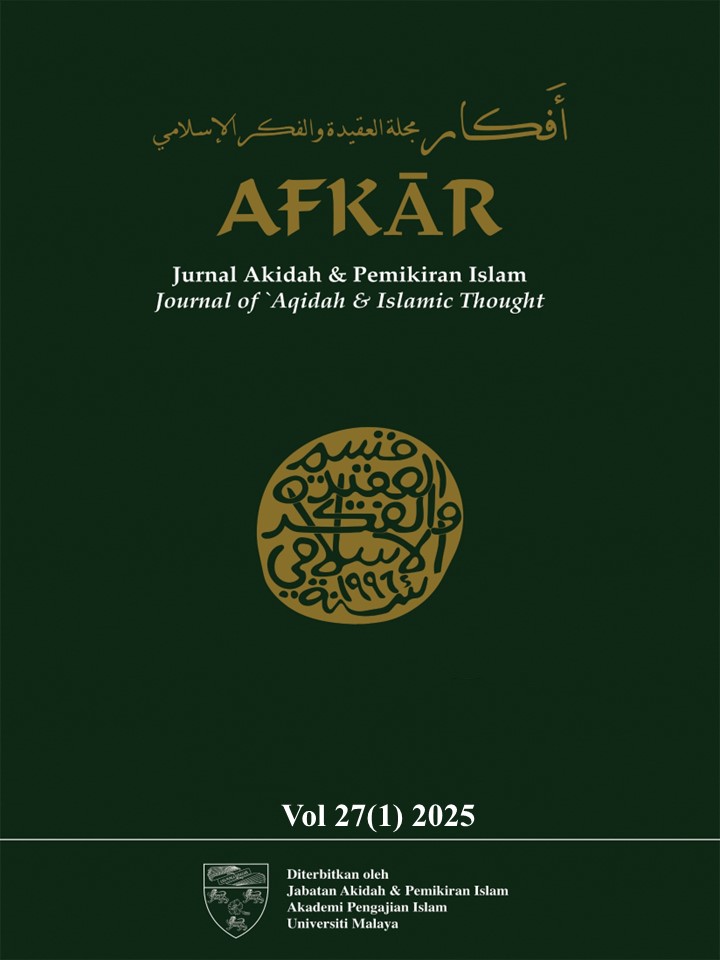أهمية العامل الروحي ودوره في المشروع الحضاري للمفكر مالك بن نبي The Importance of the Spiritual Factor and Its Role in Malek Bennabi’s Civilizational Project
Main Article Content
Abstract
The Islamic thinker Malek Bennabi (1905–1973) proposed a comprehensive civilizational project for the Islamic Ummah, aiming to halt its decline, revive its vitality, and elevate it from its setbacks, ultimately paving the way for its renaissance and reestablishing its position among advanced nations. A key pillar of this project was the concept of the effective civilizational individual, with Bennabi emphasising education, self-reform, and moral development as essential paths to cultivating such individuals. To complete his vision, Bennabi underscored the importance of the spiritual factor in both the genesis and sustainability of civilisations, considering it a foundational element alongside the intellectual factor. He observed that the spiritual factor had unified the desert Arabs and forged the cohesion of the Islamic Ummah. In contrast, the decline of this spiritual dimension was, in his view, a significant cause of the Ummah’s stagnation and regression. However, despite his strong emphasis on the spiritual factor within the collective civilizational framework, Bennabi did not devote equal attention to the spiritual development of the individual. Accordingly, this study seeks to illuminate the role of the spiritual factor in Bennabi’s civilizational thought, investigate the reasons for his limited focus on the individual’s spiritual reformation, and explore the foundational concepts and methodologies for addressing this dimension.
Downloads
Article Details

This work is licensed under a Creative Commons Attribution-NonCommercial 4.0 International License.
References
‘Afīfī, Abū al-‘Ulā. Al-Taṣawwuf al-Thawrah al-Rūḥiyyah fī al-Islām. Beirut: Dār al-Sha‘b li al-Ṭibā‘ah wa al-Naṣr, n.d.
Al-‘Uwīsī, ‘Abd Allāh bin Ḥamd. Mālik bin Nabī: Ḥayātuh wa Fikruh. Lebanon: al-Shabakah al-‘Arabiyyah li al-Abḥāth wa al-Nashr, 2012.
Amīr, Aḥmad Nabīl. “An Analysis of Ibn Khaldun’s Thoughts about Islamic Rationalism.” AL-MADA: Journal of Religion Social and Culture 5(1) (2021): 42–55. https://doi.org/10.31538/almada.v5i1.1663
Benlahcene, Badrane. “The Civilizing Role of the Religious Idea in Malik bin Nabi’s Thought.” Journal of Islamic Thought and Civilization (JITC) 13(1) (2023): 1–13. https://doi.org/10.32350/jitc.131.01
Benlahcene, Badrane. “Ḥuḍūr Afkār Ibn Khaldūn wa Ṭūynbī fī Tafsīr Mālik bin Nabī li al-Ḥarakāt al-Dawriyyah li al-Ḥaḍārah.” AFKAR: Journal of ‘Aqidah & Islamic Thought 23(2) (2021): 445–488. https://doi.org/10.32350/jitc.131.01
Bin Nabī, Mālik. Al-Ẓāhirah al-Qurʾāniyyah, trans. ʿAbd al-Ṣabūr Shāhīn. Beirut: Dār al-Fikr al-ʿArabī al-Muʿāṣir, 2000.
Bin Nabī, Mālik. Fī Maḥabb al-Maʿrakah. Beirut: Dār al-Fikr al-Muʿāṣir, 2002.
Bin Nabī, Mālik. Mīlād Mujtamaʿ. Damascus: Dār al-Fikr, 1986.
Bin Nabī, Mālik. Min Ajl al-Taghyīr. Beirut: Dār al-Fikr al-Muʿāṣir, 2005.
Bin Nabī, Mālik. Mushkilat al-Afkār fī al-ʿĀlam al-Islāmī. Beirut: Dār al-Fikr al-Muʿāṣir, 2002.
Bin Nabī, Mālik. Mushkilat al-Thaqāfah. Damascus: Dār al-Fikr, 2000.
Bin Nabī, Mālik. Mudhhakarāt al-ʿUfun, trans. Nūr al-Dīn Khundūdī. Algiers: Dār al-Ummah, 2007.
Bin Nabī, Mālik. Mudhhakarāt Shāhid li al-Qarn. Damascus: Dār al-Fikr, 1984.
Bin Nabī, Mālik. Shurūṭ al-Nahḍah, trans. ʿAbd al-Ṣabūr Shāhīn. Damascus: Dār al-Fikr, 2017.
Bin Nabī, Mālik. Wijhat al-ʿĀlam al-Islāmī. Beirut: Dār al-Fikr al-Muʿāṣir, 2002.
Bū Minjal, ʿAbd al-Mālik. “Suʾāl al-ʿIlāqah maʿa al-Ḥaḍārāt al-Gharbiyyah fī Fikr Mālik bin Nabī.” Majallat al-Fikr al-Islāmī al-Muʿāṣir 28(104): 141–184. https://doi.org/10.35632/citj.v28i104.5015
Bū Khilkhāl, ʿAbd al-Wahhāb. Qirāʾāt fī Fikr Mālik bin Nabī. Qatar: Idārat al-Buḥūth wa al-Dirāsāt al-Islāmiyyah, 1433H.
Geoffroy, Eric Jonah. Al-Mustaqbal li al-Islām al-Rūḥānī, trans. Hāshim Ṣāliḥ. Cairo: Nabḍh li al-Nashr wa al-Tawzīʿ, 2016.
Ḥawā, Saʿīd. Mudhakkarāt fī Manāzil al-Ṣiddīqīn wa al-Rabbāniyyīn. Beirut: Dār ʿAmmān, 1989.
Ḥawā, Saʿīd. Tarbiyatunā al-Rūḥiyyah: Dirāsāt Manhajiyyah Hādithah fī al-Tarbiyah wa al-Tazkiyyah wa al-Sulūk. Cairo: Dār al-Salām li al-Ṭibāʿah wa al-Nashr wa al-Tawzīʿ wa al-Tarjamah, 1999.
Ḥirz Allāh, Muḥammad Khiḍr. “Mushkilāt Bināʾ al-Mujtamaʿ fī al-ʿĀlam al-Islāmī: Ruʾyah Taḥlīliyyah li Afkār Mālik bin Nabī.” Majallat Jāmiʿat al-Amīr ʿAbd al-Qādir li al-ʿUlūm al-Islāmiyyah – Qusanṭīnah, al-Jazāʾir 36(1) (2022): 334–374. https://doi.org/10.37138/1425-036-001-010
Ḥilmī, Muṣṭafā. Ibn Taymiyyah wa al-Taṣawwuf. Alexandria: Dār al-Daʿwah li al-Ṭibāʿah wa al-Nashr wa al-Tawzīʿ, 1982.
Ḥilmī, Muṣṭafā. Maʿrifat Allāh ʿAzza wa Jalla wa Ṭarīq al-Wuṣūl ilayh ʿinda Ibn Taymiyyah. Alexandria: Dār al-Daʿwah, 1995.
Jamsari, Ezad Azraai et al. “Malek Bennabi and the Development of Human Civilization.” International Journal of Advanced Research (IJAR) 11(1) (2023): 1746–1754. https://doi.org/10.21474/IJAR01/16201
Saoud, Tarek. “Les idées comme moteur de la culture et de la civilisation chez Malek Bennabi.” ALMAWAQIF: Revue des Recherches Sociologiques et Historiques 19(1) (2023): 1187–1198.
Tahir, Zhilwan. “Comparative Perspectives on Societal Decline: Ibn Khaldun, Toynbee, and Hegel.” Journal of History and Social Sciences 3(4) (2024): 431–446. https://doi.org/10.58355/historical.v3i4.163
Ibn Taymiyyah. Majmūʿ al-Fatāwā. Saudi Arabia: Majmaʿ al-Malik Fahd li Ṭibāʿat al-Muṣḥaf al-Sharīf, 1995.
Toynbee, Arnold J. Mukhtaṣar Dirāsat al-Tārīkh, trans. Fuʾād Muḥammad Shibl. Cairo: al-Markaz al-Qawmī li al-Tarjamah, 2011.

